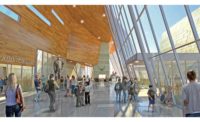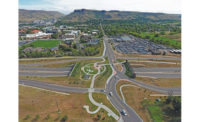Merrick & Co. Chosen as Colorado Design Firm of the Year for 2015






As much as it focuses on the U.S. government, Merrick is now emphasizing private-sector and local and state government contracts. Huelskamp says the company at one time did about 75% of its business with the federal government; the current ratio is around 50/50.
Green Interaction
Much of the private-sector and local government work comes from Merrick's fourth business unit—sustainable infrastructure. Notable recent endeavors have included a two-mile-long environmental restoration project on the Chattahoochee River between Georgia and Alabama; computerized, airborne geomatic surveying for the Alyeska Pipeline in Alaska; and continuing design work for Coventry Development Corp.'s 3,500-acre RidgeGate residential and commercial real estate project in Lone Tree, Colo.
The "sustainable" in sustainable infrastructure comes through in a couple of ways. In addition to designing buildings and other facilities that are environmentally friendly, Merrick is proud of the way people interact with its projects. Sherry points to a white-water rafting course the company's McLaughlin Whitewater Design Group created as part of the Chattahoochee River project. Darryl Jones, vice president and development manager of Coventry Development Corp., points to something as simple and yet important as an aesthetically pleasing retaining wall that blends in with its surroundings at RidgeGate.
Coventry, like the military and the DOE, is another of Merrick's long-term clients. The company has done business with Merrick since 2006, and like Cool Planet, considers Merrick almost an extension of itself.
"They are very proactive," Jones says. "They understand from a development standpoint what we need—what are the issues we're going to encounter from the various jurisdictions and municipalities that we have to work with, whether it's the Army Corps of Engineers on drainage issues or working with the city engineering staff on street standards.
"They anticipate problems, which is very important in the development sector. You want to have as much certainty in the process as you can," Jones adds. "Based on their experience, they tend to anticipate issues that we might face. They really are an extension of our staff."
Randy Tucker, vice president of capital projects for Cool Planet, appreciates the flexibility that Merrick has exhibited toward an entrepreneurial client that is just bringing its product to the commercial stage.
"They've shown tremendous creativity and innovation in working with us," Tucker says. "One of the biggest challenges is that we're a startup. They're very schedule driven and cost conscious. We're not always that way. But they've stuck with us the whole way."
That's just part of the startup game, says Huelskamp, and it is a conscious part of the company's strategy—especially in biofuels, where Merrick has been a player for the past 15 years. "We're a mid-sized company," Huelskamp explains. "So we're flexible enough to say, 'Look, we can put 15 people on a project for two months, and then while you evaluate it, we'll come off the job, do something else, and get back with you.'
"We try to get ourselves in a position of what we call a trusted adviser," he adds. "We're not disinterested engineers just cranking out the numbers. We're advising them on technology, cost and schedule all the way through."
That kind of involvement is the sort of thing that keeps customers. Huelskamp himself regularly meets with clients to get a report card on how Merrick is doing. Based on what customers like Tucker and Jones are saying, this year's marks should be pretty high.










